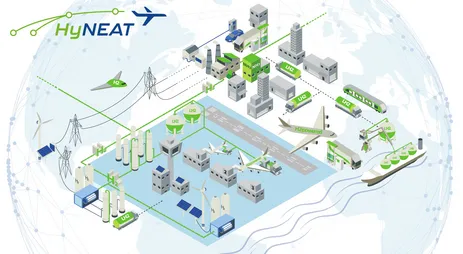Description
The use of green hydrogen as a propulsion system for larger commercially used aircraft is a promising alternative to enable more environmentally friendly aviation. However, it is essential that the hydrogen is produced from renewable energy sources to make a contribution to climate protection. In addition to the development of new propulsion systems and aircraft concepts, the establishment of a corresponding hydrogen infrastructure is one of the biggest challenges in order to enable competitive operating costs for the new aircraft.

The joint project HyNEAT (Hydrogen Supply Networks' Evolution for Air Transport) is developing concepts for global hydrogen supply infrastructures for use in H2-powered aircraft. The aim is to present long-term perspectives and possible transition paths in line with a global energy transition and to derive recommendations for action for politics and industry. Three levels of consideration are in focus: the global H2 potential for aviation, the European energy system including the effects on countries in Africa and the Middle East, and the local implementation at a prototypical airport.
The Institute of Plant and Process Technology is considering hydrogen supply chains to enable a techno-economic analysis. To this end, models of components for compression, liquefaction, and storage of hydrogen are being created. Based on the component and overall system modeling, concrete business models are also being examined.
Further information is available on the project website (https://www.hyneat.de/).

